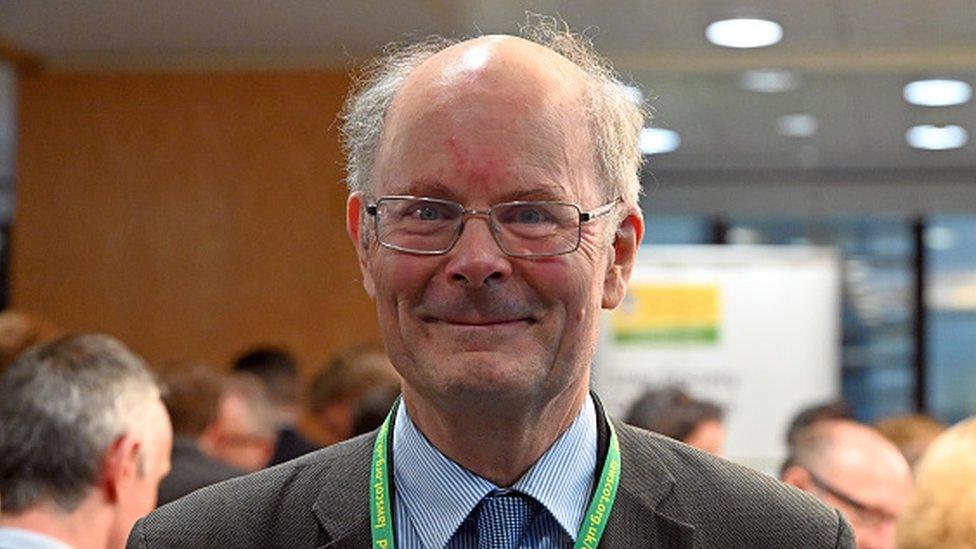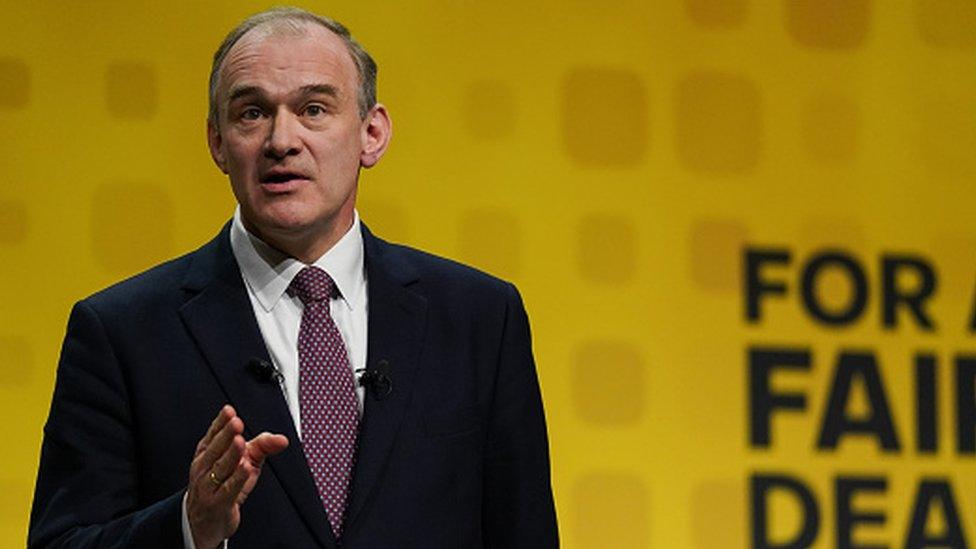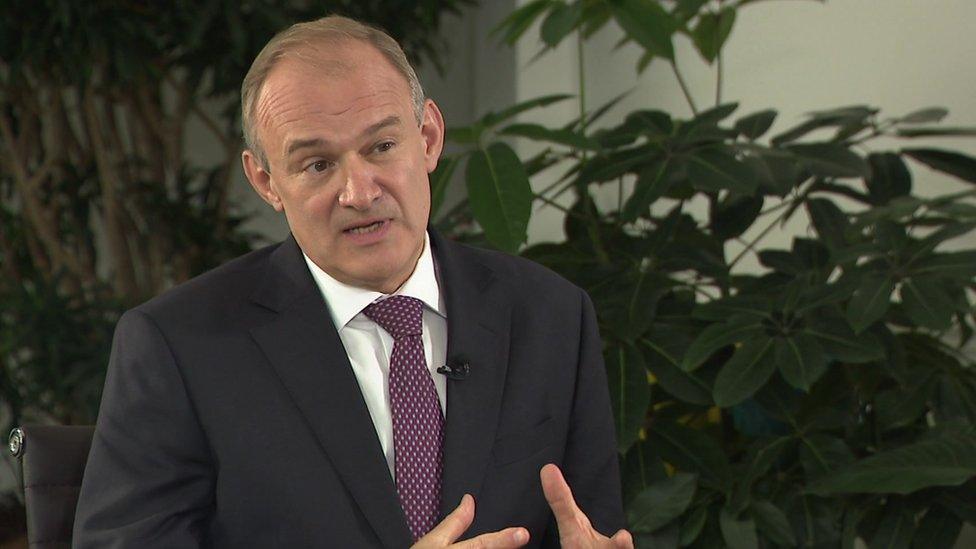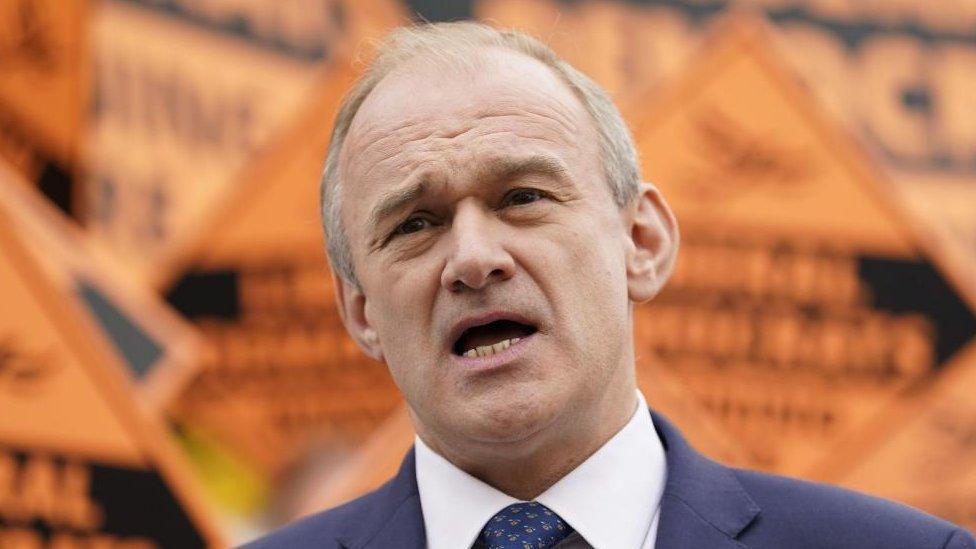John Curtice: Lib Dems are losing votes to Labour
- Published

Sir Ed Davey's party has been doing well at by-elections
The Liberal Democrats are "losing votes to Labour" because of their reluctance to talk about Brexit, polling guru Sir John Curtice has said.
Prof Curtice explained why the Lib Dems were struggling in the opinion polls to a room packed with party activists.
He said they had lost ground to Labour among voters who would like to rejoin the European Union.
Ahead of the Lib Dem conference, leader Sir Ed Davey said rejoining the EU was currently "off the table".
Brexit was once the party's defining issue, but at its conference in Bournemouth, the Lib Dems are focusing on other areas, with a raft of "family friendly" policies such as more parental leave and flexible child care.
The party's pre-manifesto, which is due to be approved and voted on at the conference, describes EU membership as a "long-term objective" rather than an immediate priority.
This cautious positioning has not gone down well with the party faithful who believe the Lib Dems should be pushing for a rapid return to the EU.
The party's messaging on Europe - and whether it is bold enough - was the subject of lively debate at a fringe event on the first day of conference.
At the event - titled "Shouldn't we be doing better?" - Professor Curtice suggested the party would benefit from being bolder on Europe, or other core issues.
Following the event, he told the BBC that "given their current standing in the opinion polls, they still face a formidable challenge at the next general election".
He said the Lib Dems had done well in by-elections in Conservative-held seats, most recently by winning in Somerton and Frome.
But he said despite Conservative woes, the Lib Dems have not "managed to get above the 12% in the polls that they got in the 2019 general election".
He estimated that based on current national opinion polling, the best the party could hope for was about 30 seats in the House of Commons - double the number they have at the moment, but still well short of their pre-coalition strength.
So where is the party losing ground?
Professor Curtice said: "The truth is, while the party has focused on attacking the Conservatives, it has perhaps failed to notice that it's losing votes to Labour.
"In particular, it's losing the votes of people who want to be inside the EU to Labour.
"Whereas Labour can argue it has gained ground among both Leave and Remain voters.
"The Liberal Democrats have frankly lost ground among Remain voters and the ground that they have gained amongst Leave voters is not sufficient to compensate for it."

Professor John Curtice said the Lib Dems need to be bolder to win over more voters
In recent weeks, Labour has shifted its position on Europe, going from an effective vow of silence to talking up closer relations with EU states.
Last week, Labour leader Sir Keir Starmer visited the Netherlands to discuss migration and had a meet-and-greet with French President Emmanuel Macron in Paris.
And in terms of policy, Labour has been open about its desire to rewrite the EU-UK trade deal and find ways to improve co-operation with European nations.
In contrast, the Lib Dems have been relatively shy in articulating their post-Brexit vision for the UK.
Appearing alongside Professor Curtice at the conference event, Liberal Democrat MP Layla Moran was asked to give her view on the party's approach to Europe.
She said while the party wanted to rejoin the EU, "to get even close to that point, we have to do stuff before to repair that relationship".
The party's foreign affairs spokeswoman said the Lib Dems needed to talk about Brexit "in a way that doesn't push people away".
Ms Moran - a former Lib Dem leadership contender - she said expected the party's policy on Europe to "move" following the conference.
"We need to work out where we need to put the dial at the moment," she said.
Elsewhere at the conference, Sir Ed said his party would seek "root-and-branch" reform of the UK's post-Brexit relationship with the EU rather than "tinkering around the edges" of the existing deal.
Will that be enough to win over the Europhiles who have strayed to Labour though?
When asked if the Lib Dems should be bolder on Europe, Professor Curtice said the party needed to be "willing to take a risk".
"In doing that, it needs to think about the kind of people it's most likely to attract," said the professor of politics at Strathclyde University.
"And the honest truth is, that's more likely to be people who are in favour of being inside the European Union rather than outside."
Related topics
- Published23 September 2023

- Published19 September 2023

- Published22 September 2023
